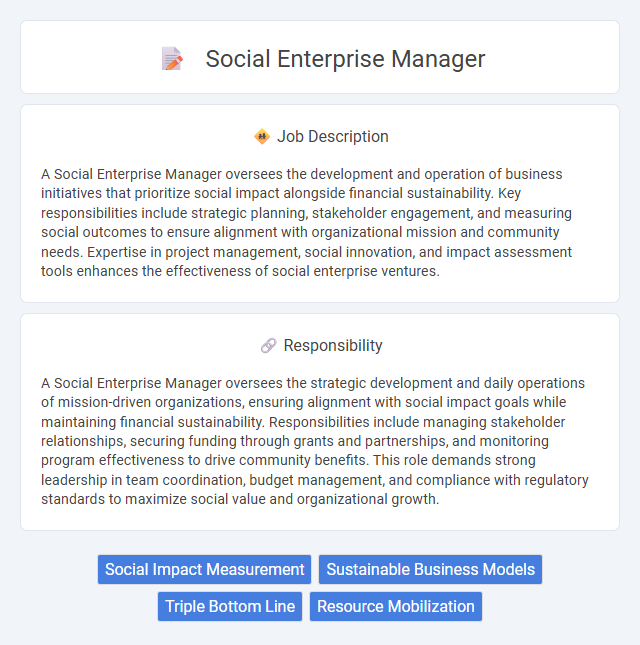
A Social Enterprise Manager oversees the development and operation of business initiatives that prioritize social impact alongside financial sustainability. Key responsibilities include strategic planning, stakeholder engagement, and measuring social outcomes to ensure alignment with organizational mission and community needs. Expertise in project management, social innovation, and impact assessment tools enhances the effectiveness of social enterprise ventures.
Individuals with a strong passion for social impact and a commitment to community improvement are likely well-suited for the role of a Social Enterprise Manager. Those who thrive in dynamic environments, possess excellent leadership and communication skills, and can navigate the balance between business objectives and social goals may find this position fulfilling and effective. People who are adaptable, empathetic, and motivated by purpose may have a higher probability of succeeding as Social Enterprise Managers.
Qualification
A Social Enterprise Manager typically requires a bachelor's degree in business administration, social entrepreneurship, or a related field, with experience in project management and stakeholder engagement. Strong leadership skills, financial acumen, and knowledge of social impact measurement tools are essential for driving sustainable growth and community development. Proficiency in communication, strategic planning, and fundraising is also critical to successfully manage social enterprise operations.
Responsibility
A Social Enterprise Manager oversees the strategic development and daily operations of mission-driven organizations, ensuring alignment with social impact goals while maintaining financial sustainability. Responsibilities include managing stakeholder relationships, securing funding through grants and partnerships, and monitoring program effectiveness to drive community benefits. This role demands strong leadership in team coordination, budget management, and compliance with regulatory standards to maximize social value and organizational growth.
Benefit
A Social Enterprise Manager likely enhances community impact while driving sustainable business growth, which may improve both social outcomes and financial stability. This role can provide opportunities for meaningful engagement with diverse stakeholders, increasing job satisfaction and professional development. There is a probable benefit in fostering innovation by addressing social issues through enterprise solutions, positioning the organization as a leader in social responsibility.
Challenge
Managing a social enterprise likely involves navigating complex challenges such as balancing financial sustainability with social impact goals. The role probably requires strategic problem-solving to address resource constraints and diverse stakeholder expectations. Effective leadership and adaptability may be critical in overcoming unpredictable market and community dynamics.
Career Advancement
A Social Enterprise Manager drives mission-driven business initiatives to generate social impact while ensuring financial sustainability, leveraging strategic planning and stakeholder engagement skills. Mastery in impact measurement, fundraising, and team leadership opens pathways to senior roles such as Director of Social Innovation or Chief Impact Officer. Continuous professional development in social entrepreneurship and partnership management significantly enhances career advancement opportunities in this growing sector.
Key Terms
Social Impact Measurement
Social Enterprise Managers specialize in implementing robust Social Impact Measurement frameworks to evaluate the effectiveness of community-driven projects. They utilize key performance indicators (KPIs), qualitative and quantitative data, and impact assessment tools to ensure projects generate measurable social value. Mastery in data analysis and stakeholder engagement drives continuous improvement and substantiates the enterprise's commitment to social responsibility.
Sustainable Business Models
A Social Enterprise Manager drives the development and implementation of sustainable business models that balance social impact with financial viability. They leverage impact measurement tools and stakeholder engagement strategies to ensure long-term social and environmental benefits. Proficiency in CSR initiatives, impact investing, and inclusive entrepreneurship is essential to foster growth within social ventures.
Triple Bottom Line
A Social Enterprise Manager drives business strategies that balance financial performance with social impact and environmental sustainability, embodying the Triple Bottom Line framework. They implement programs that generate profit while advancing community well-being and reducing ecological footprints. Expertise in measuring social and environmental outcomes alongside economic metrics is essential for effective decision-making and long-term value creation.
Resource Mobilization
A Social Enterprise Manager specializing in resource mobilization drives fundraising strategies to secure financial support from diverse channels including grants, investors, and partnerships. They analyze market trends and stakeholder needs to optimize funding proposals and donor engagement, ensuring sustainable growth for social impact initiatives. Expertise in budgeting, reporting, and relationship management is crucial to maximize resource inflow and allocate funds efficiently.
 kuljobs.com
kuljobs.com